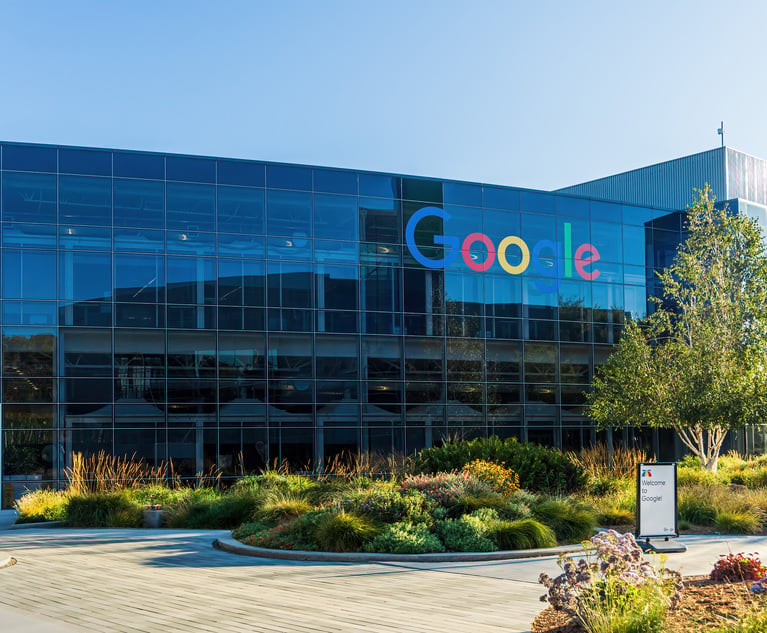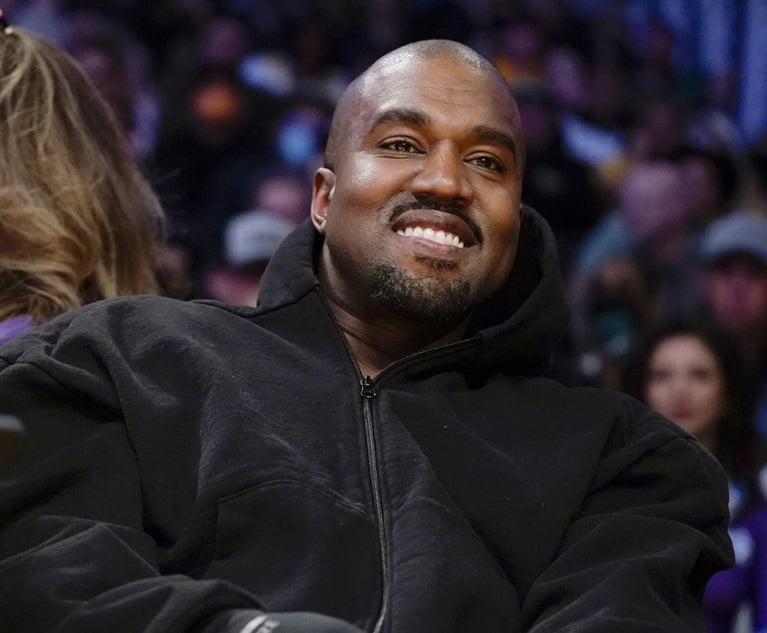 U.S. Court of Appeals for the Ninth Circuit. Credit: Jason Doiy/ ALM
U.S. Court of Appeals for the Ninth Circuit. Credit: Jason Doiy/ ALMAppeals Court Revives Minimum-Wage Fight in Clash Between State, Federal Law
Marriott's lawyers at Seyfarth Shaw had removed the case to California federal district court, arguing the claims were pre-empted by federal laws that govern collective bargaining. The appeals court revived the suit, and ordered the case to return to state court.
August 31, 2018 at 05:06 PM
4 minute read
A federal appeals court Friday revived a worker's minimum wage claim against Marriott Hotel Services Inc. in a case that pit federal collective bargaining laws against a California city's minimum wage ordinance.
The three-judge panel of the U.S. Court of Appeals for the Ninth Circuit overturned a lower court's ruling that had gone against the hotel worker, Ian McCray, who argued he was paid less than the minimum wage set by the city of San Jose. The divided appeals court said the trial judge did not have jurisdiction over the dispute and ordered that the merits of the dispute should play out in state court, where the case originated.
The dispute centers around a San Jose ordinance that set a minimum wage higher than the national rate, increasing with cost-of-living raises each year since 2012 to reach $15 by January 2019. The minimum wage is currently set at $13.50 per hour. McCray's union waived the ordinance's minimum wage requirement to bargain instead for other benefits.
McCray filed a lawsuit in Santa Clara court against the Marriott Hotel in San Jose, where he worked in the restaurant for $9 per hour. At that time, the city ordinance set the minimum wage at $10 per hour. Marriott and the workers union, Unite Here Local 19, agreed that workers could be paid less than $10 hourly. McCray's suit said Marriott owed workers the difference between their wages and the minimum wage.
Marriott, represented by Seyfarth Shaw, removed the case to the U.S. District Court for the Northern District of California. The company's lawyers argued that the claims were pre-empted by federal laws that govern collective bargaining.
The appeals court panel held Friday that the district court “lacked subject matter jurisdiction to hear the case” and ordered the district court to return the case to state court to determine the merits of the argument.
 Judge Albert Diaz. Photo by Diego M. Radzinschi/ALM
Judge Albert Diaz. Photo by Diego M. Radzinschi/ALM“While we recognize the strong pre-emptive force of (the federal statute), McCray's lawsuit amounts to an interpretive challenge to the San Jose ordinance, not one that requires substantial analysis of his union's collective-bargaining agreement,” Judge Albert Diaz wrote for the majority, which included Judge Ronald Gould. Judge Mary Schroeder dissented. Diaz, a judge on the Fourth Circuit, was sitting by designation.
Seyfarth Shaw partner William Dritsas in San Francisco, a lawyer for Marriott, declined to comment. The union, participating as an amicus, was represented by Paul More of McCracken, Stemerman & Holsberry. James Pagano of Pagano & Kass, who represented McCray, applauded the Ninth Circuit's ruling.
“It is our hope that when the arguments about the meaning of the statute are fleshed out, many more employees who, frankly, we believe have been cast aside by their union, will be entitled to receive the bare minimum wages to which they have long been entitled,” Pagano said in an email Friday.
Anticipating the passage of San Jose's minimum wage ordinance, Marriott and Unite Here opted out of the requirement. The union said it decided to negotiate health care and other benefits for its members.
“At bottom, this case is a matter of statutory interpretation,” Diaz wrote on Friday. “The primary task of the court deciding this case will be to determine whether the minimum wage established by the ordinance is waivable.”
Schroeder argued in her dissent that the heart of McCray's case was a collective bargaining agreement, which was subject to federal law and not an interpretation of a city statute.
“The essence of McCray's claim is that the employer is required to pay the city's minimum wage. Thus, he contends the opt-out contained in the (collective bargaining agreement) is not to be given effect,” Schroeder wrote. “Of course McCray's complaint does not discuss the (collective bargaining agreement) because he wishes the claim to be litigated in state court, but the district court correctly recognized that the dispute is actually about the (agreement). We should similarly reject the pretense that this case is about state law.”
The Ninth Circuit's ruling is posted below:
|➤➤ Get employment law news and commentary straight to your in-box with Labor of Law, a new Law.com briefing. Learn more and sign up here.
This content has been archived. It is available through our partners, LexisNexis® and Bloomberg Law.
To view this content, please continue to their sites.
Not a Lexis Subscriber?
Subscribe Now
Not a Bloomberg Law Subscriber?
Subscribe Now
NOT FOR REPRINT
© 2024 ALM Global, LLC, All Rights Reserved. Request academic re-use from www.copyright.com. All other uses, submit a request to [email protected]. For more information visit Asset & Logo Licensing.
You Might Like
View All
Justices Seek Solicitor General's Views on Music Industry's Copyright Case Against ISP

Judge to Hear Arguments on Whether Google's Advertising Tech Constitutes a Monopoly
3 minute read
SEC Targets Rising Crypto Financier in $115 Million Securities Fraud
3 minute read
Trending Stories
- 1Daniel Habib to Serve as Next Attorney-in-Charge of NY Federal Defender Appeals Unit
- 2Protecting Attorney-Client Privilege in the Modern Age of Communications
- 3High-Profile Sidley M&A Partner Heads to Covington
- 4Stars and Gripes: Firms Need a 'Superstar Culture' to Crack the U.S. Market
- 5BCLP Exploring Merger Prospects as Profitability Lags, Partnership Shrinks
Who Got The Work
Michael G. Bongiorno, Andrew Scott Dulberg and Elizabeth E. Driscoll from Wilmer Cutler Pickering Hale and Dorr have stepped in to represent Symbotic Inc., an A.I.-enabled technology platform that focuses on increasing supply chain efficiency, and other defendants in a pending shareholder derivative lawsuit. The case, filed Oct. 2 in Massachusetts District Court by the Brown Law Firm on behalf of Stephen Austen, accuses certain officers and directors of misleading investors in regard to Symbotic's potential for margin growth by failing to disclose that the company was not equipped to timely deploy its systems or manage expenses through project delays. The case, assigned to U.S. District Judge Nathaniel M. Gorton, is 1:24-cv-12522, Austen v. Cohen et al.
Who Got The Work
Edmund Polubinski and Marie Killmond of Davis Polk & Wardwell have entered appearances for data platform software development company MongoDB and other defendants in a pending shareholder derivative lawsuit. The action, filed Oct. 7 in New York Southern District Court by the Brown Law Firm, accuses the company's directors and/or officers of falsely expressing confidence in the company’s restructuring of its sales incentive plan and downplaying the severity of decreases in its upfront commitments. The case is 1:24-cv-07594, Roy v. Ittycheria et al.
Who Got The Work
Amy O. Bruchs and Kurt F. Ellison of Michael Best & Friedrich have entered appearances for Epic Systems Corp. in a pending employment discrimination lawsuit. The suit was filed Sept. 7 in Wisconsin Western District Court by Levine Eisberner LLC and Siri & Glimstad on behalf of a project manager who claims that he was wrongfully terminated after applying for a religious exemption to the defendant's COVID-19 vaccine mandate. The case, assigned to U.S. Magistrate Judge Anita Marie Boor, is 3:24-cv-00630, Secker, Nathan v. Epic Systems Corporation.
Who Got The Work
David X. Sullivan, Thomas J. Finn and Gregory A. Hall from McCarter & English have entered appearances for Sunrun Installation Services in a pending civil rights lawsuit. The complaint was filed Sept. 4 in Connecticut District Court by attorney Robert M. Berke on behalf of former employee George Edward Steins, who was arrested and charged with employing an unregistered home improvement salesperson. The complaint alleges that had Sunrun informed the Connecticut Department of Consumer Protection that the plaintiff's employment had ended in 2017 and that he no longer held Sunrun's home improvement contractor license, he would not have been hit with charges, which were dismissed in May 2024. The case, assigned to U.S. District Judge Jeffrey A. Meyer, is 3:24-cv-01423, Steins v. Sunrun, Inc. et al.
Who Got The Work
Greenberg Traurig shareholder Joshua L. Raskin has entered an appearance for boohoo.com UK Ltd. in a pending patent infringement lawsuit. The suit, filed Sept. 3 in Texas Eastern District Court by Rozier Hardt McDonough on behalf of Alto Dynamics, asserts five patents related to an online shopping platform. The case, assigned to U.S. District Judge Rodney Gilstrap, is 2:24-cv-00719, Alto Dynamics, LLC v. boohoo.com UK Limited.
Featured Firms
Law Offices of Gary Martin Hays & Associates, P.C.
(470) 294-1674
Law Offices of Mark E. Salomone
(857) 444-6468
Smith & Hassler
(713) 739-1250






